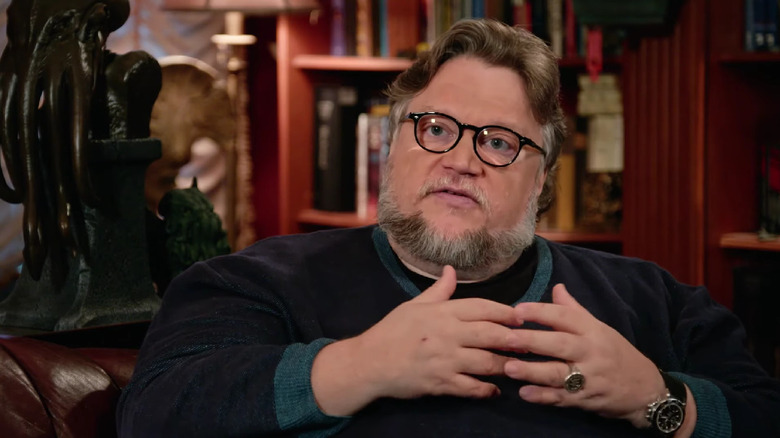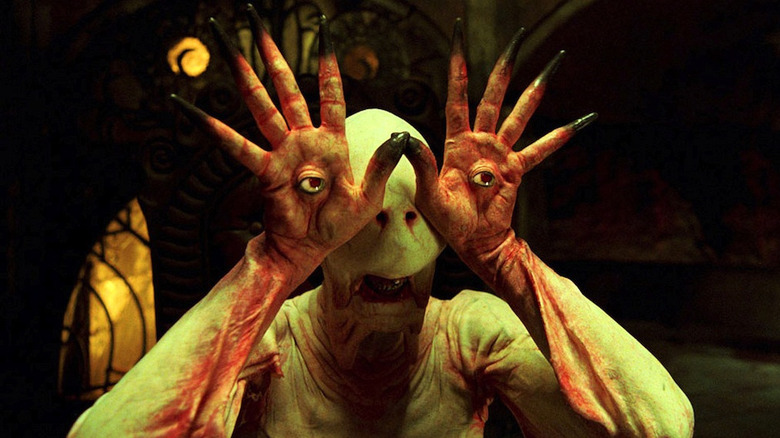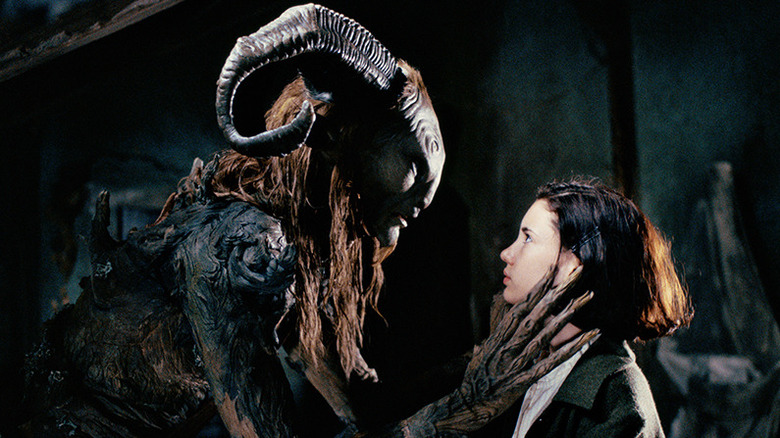According To Guillermo Del Toro, We Have The Universe To Thank For Pan's Labyrinth
Guillermo del Toro sat at a crossroads in 2005. The heat was still palpable from the pair of Hollywood tentpole films he made, "Blade II" and "Hellboy." The University of Guadalajara alum had gotten offers to stay on the superhero path, working with big studio properties, or he could embark on an intensely personal project with less money, but fewer creative restrictions.
To celebrate the 15th anniversary of "Pan's Labyrinth," the Academy Museum of Motion Pictures hosted Del Toro, actor Doug Jones, and cinematographer Guillermo Navarro for a screening and Q&A. There, the "Cronos" director looked back on his 2006 fantasy-horror with pride and awe. But there was a time when he was unsure that it was the right move to make, following the praise he received for his superhero movie entries. "After 'Hellboy' and 'Blade II' were successful, I got offered every superhero movie — they were starting to pick up," Del Toro said at the event. "I was thinking about it because it was very tempting and I said, 'Do I do 'Pan's Labyrinth' or do I do a big movie?'"
For context, Del Toro's "Blade" sequel released in 2002 and "Hellboy" dropped in 2004, right when Sam Raimi's "Spider-Man" films were enjoying lucrative box office returns; "X2," "Daredevil," and Ang Lee's take on the Incredible Hulk all came out in the interim between Del Toro's comic book adaptations. As such, the filmmaker was still mulling over the opportunity to do more hero pictures when fate struck and he forgot his dog-eared notebook in the back of a London cab. As devastating as the prospect is to any writer, the driver promptly returned the notebook to the storyteller, who took it as a sign from the heavens.
"I said, I understand Lord," recalls Del Toro, "I'll do 'Pan's Labyrinth,' but give me my notebook back."
'Lost Causes Are the Only Ones Worth Fighting For'
Considered one of the great modern fantasies, "Pan's Labyrinth" is a fairy tale of innocence, monsters, and men. It tells the story of young Ofelia (Ivana Baquero), who lives with her pregnant mother Carmen (Ariadna Gil) in Francoist Spain during the Second World War, along her vicious new stepfather, commander Captain Vidal (Sergi López). Its ensuing meditation on war and monstrosity earned the movie a 22-minute standing ovation at Cannes, and stands arguably tall as Del Toro's most potent work to date.
The decision to work on his "Pan's Labyrinth" project was not without peril; a smaller movie meant a smaller production, with fewer of the protections that bigger studio endeavors offer. It was no sweat for the creator, who explains in the foreword to "Pan's Labyrinth: Inside the Creation of a Modern Fairy Tale":
It was, no doubt, the wrong Mexico-Spain co-production to attempt at that particular time. Catalonian horror was fruitful, yes, but always viewed as a sensibly budgeted exercise. And a big-budget movie like "The Others" always demanded an international cast and had to be shot in English. Mexico offered a limited amount of money for co-production, and we had to fill key positions and achieve a postproduction process that (in Mexico, at the time) was uncharted territory.
With such limitations from the jump and with tempting opportunities from studios, why launch what will clearly be a painful experience? The director sums it up a paragraph later: "Lost causes are the only ones worth fighting for."
'It is the Duty of the Filmmaker to Remain Unreasonable'
And he did fight: production was frought with mutinies and mishaps that compelled the team to get resourceful. Doug Jones' Faun creature required an entirely novel system for movement onscreen, and budget constraints diluted Del Toro's original concepts of the Pale Man (also played by Jones). The director's foreword again elaborates:
We only did what we could afford and we only afforded what was vital. Zen through limitations, you might call it. But it is the duty of the filmmaker to remain unreasonable. To stay ambitious past the printed budget or schedule. It makes no difference if the budget is 190 million or 19 million, your vision must hunger for much, much more and deliver value and artistic worth well above the numbers.
In that sense, "Pan's Labyrinth" can be considered a high-flying success; Del Toro's singular vision is evident in every frame of the story, layering over itself like a strudel until it achieves one of the most emotionally resonant endings of any of his films. In the meantime the director has been enjoying further critical acclaim, this time with "Nightmare Alley" in the running for multiple accolades at this year's industry awards shows. The view from up high hasn't obscured his love of a challenge, though; Del Toro told the Academy crowd, "I like going from big movies to smaller movies," del Toro said. "I like it because it keeps you honest, and it keeps you scared. Both things are very important."
Next up for the filmmaker is his stop-motion animated musical "Pinocchio," which arrives on Netflix in December of 2022.


